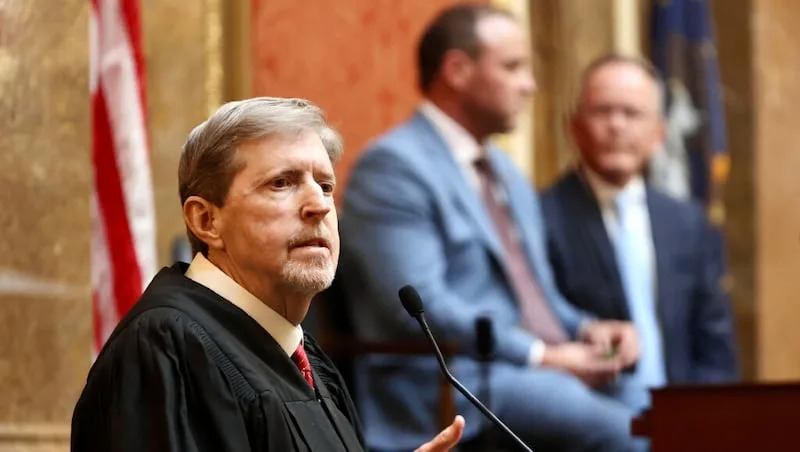
The Utah Legislature’s Judiciary Interim Committee on Wednesday voted to favorably recommend legislation that would change how the Utah Supreme Court’s chief justice is appointed, and said they would prioritize the legislation in a potential upcoming special session.
During the committee hearing Wednesday at the Capitol, the committee heard from the sponsor of the draft legislation and members of the public before voting. The draft legislation passed through the committee with a 7-4 vote among representatives and 4-1 among senators.
This draft legislation comes after a similar bill that passed the Legislature during this year’s general session was vetoed by Gov. Spencer Cox. The legislation’s sponsor said he worked with the governor’s office on changes to the bill.
What changes would this legislation make?
Currently, the chief justice is chosen by the other justices on the court. Under this new proposed legislation, the governor would appoint a chief justice from among the current justices. This choice would then be subject to advice and consent of the state Senate.
This would occur only when the position of chief justice becomes available, due to term expiry, death, resignation or removal.
“The bill clarifies that the current chief justice, Chief Justice (Matthew B.) Durant, who was appointed in 2024, will still have a four-year term. His term is set to expire on April 1, 2028, of course, unless he retires or steps down from being chief justice,” said Sen. Chris Wilson, R-Logan, sponsor of the draft legislation.
The legislation would also implement a new chief justice term length of eight years. It also limits the number of terms a chief justice can serve to one.
One point that was highlighted throughout the hearing was that the Utah Constitution gives the legislature the power to dictate this appointment process.
What changes were made from the previous bill?
During the 2025 legislative session, Wilson sponsored SB296, which passed through the Legislature, but was vetoed by the governor.
“What we have here, this judiciary amendments bill, is a compromise,” Wilson said during his presentation to the committee.
The senator said he has worked with the governor’s office to negotiate the language in the bill. He added that the governor is “completely” on board with it now.
The main change between this legislation and SB296 is changing it from four-year terms to one eight-year term.
Wilson said he has not spoken directly with the Utah Supreme Court on this and is unsure what their stance on the legislation is.
Sen. Brady Brammer, R-Pleasant Grove, said that the Supreme Court is aware of what is going on with this legislation and the conversations that are being had.
He also spoke about the concerns of judicial independence that are brought up because of this legislation.
“There’s been some questions about, you know, the independence of the judiciary. I think that’s essential, on a case-by-case basis, structurally, as it relates to the form and function of the judiciary; they are very much an interdependent body,” Brammer said.
He added that according to the State Constitution, the Legislature gets to dictate how they operate structurally but when it comes to the handling of cases, the judiciary has independence.
How do other states appoint their chief justices?
One question asked of Wilson during his presentation was about how other states appoint their chief justices.
He said there are 13 other states where the governor currently appoints the chief justices. In most other states, the chief justice is chosen by the other justices.
Wilson also pointed out that the federal process is similar to this proposed legislation, in that the chief justice is appointed by the executive branch and confirmed by the legislative branch.
Committee chair Todd Weiler, R-Woods Cross, also looked up how other states appoint their chief justices and shared some of his findings.
According to Weiler, in South Carolina and Virginia, the legislature is allowed to pick the high court justices instead of the governor, while in North Carolina, the chief justice is chosen by all of the judges in the state including supreme court judges and district court judges.
In seven states, elections are used to select chief justices and in four states, the chief justice is determined by seniority.
Public weighs in on legislation
During public comment period on Wednesday, Stan Rasmussen, vice president of government affairs at the Sutherland Institute, spoke in favor of the legislation on behalf of the institute.
“We express support for this proposal, and for public record I wanted to express appreciation for Sen. Wilson in these revisions and encourage each of you to support the bill,” Rasmussen said.
Business owner Steven Rosenberg spoke against the bill, saying that the justices should be left to choose their own leader.
“If something isn’t broken, then why are we changing it? If it’s worked throughout the history of this great state of Utah, why must we change it now?” Rosenberg said.
Camille James, a resident of Ogden, also spoke out against the legislation saying “We should not have one person choosing the chief justice of our Utah Supreme Court.”
Members of the committee said the governor’s choice has to be approved by the Senate, meaning there isn’t just one person making the decision.
What does the court’s chief justice do?
Michael Drechsel, assistant state court administrator, said the chief justice operates as the chief administrative officer of the Supreme Court and the judiciary under the state Constitution.
This includes administering the day-to-day operations of the Supreme Court. How this is done, Drechsel said, varies with the person.
Drechsel confirmed that the chief justice does not tell the other justices how to rule on decisions, and does not get to pick which cases are heard and aren’t heard.







Comments